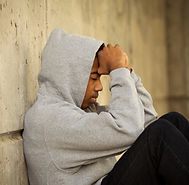

LABELS & GRAPHICS VERTICAL SPACING BOTTOM OF TOP ITEM TO THE TOP OF THE BOTTOM ITEM
LABELS & GRAPHICS VERTICAL SPACING BOTTOM OF TOP ITEM TO THE TOP OF THE BOTTOM ITEM
ANXIETY
What is it?
When the experience of Anxiety interferes with your life, then you possibly have an Anxiety Disorder.

Generalized Anxiety Disorder (GAD)
Generalized Anxiety Disorder (GAD) is characterized by persistent and excessive worry about a number of different things. Individuals with GAD find it difficult to control their worry. They may worry more than seems warranted about actual events or may expect the worst even when there is no apparent reason for concern.
They anticipate disaster and may be overly concerned about money, health, family, work, or other issues. GAD is diagnosed when a person finds it difficult to control worry on more days than not for at least six months and has three or more symptoms.
Sometimes just the thought of getting through the day produces anxiety. They don’t know how to stop the worry cycle and feel it is beyond their control, even though they usually realize that their anxiety is more intense than the situation warrants.
Panic Disorder and Agoraphobia
Panic disorder is diagnosed in people who experience spontaneous seemingly out-of-the-blue panic attacks and are preoccupied with the fear of a recurring attack. Panic
attacks occur unexpectedly, sometimes even during sleep. Palpitations, pounding heart, or accelerated heart rate.
Common Symptoms
-
Sweating
-
Trembling or shaking
-
Sensations of shortness of breath or smothering
-
Feelings of choking
-
Chest pain or discomfort
-
Nausea or abdominal distress
-
Feeling dizzy, unsteady, light-headed, or faint
-
Chills or heat sensations
-
Paresthesia (numbness or tingling sensations)
-
Derealization (feelings of unreality) or depersonalization (being detached from oneself)
-
Fear of losing control or
“going crazy” -
Fear of dying



Too Often, people don't know that their
symptoms are a disorder and are treatable
Too often, people don't know that their symptoms are a disorder and are treatable. Some are afraid or embarrassed to tell anyone about what they experience for fear of being considered a complainer. Instead they distance themselves from friends, family, and others who could be helpful.
Agoraphobia
Some people stop going into situations or places in which they've previously had a panic attack in anticipation of it happening again. These people have agoraphobia, and they typically avoid public places where they feel immediate escape might be difficult, such as shopping malls, public transportation, or large sports arenas.
Social Anxiety Disorder
It’s the extreme fear of being scrutinized and judged by others in social or performance situations: Social anxiety disorder can wreak havoc on the lives of those who suffer from it. This disorder is not simply shyness.
Symptoms may be so extreme that they disrupt daily life. People with this disorder, also called social phobia, may have few or no social or romantic relationships, making them feel powerless, alone, or even ashamed.
Although they recognize that the fear is excessive and unreasonable, people with social anxiety disorder feel powerless against their anxiety. They are frightened that they will humiliate or embarrass themselves.
The anxiety can interfere with daily routines, occupational performance, or social life, making it difficult to complete school, interview and get a job, and have friendships and romantic relationships.
Specific Phobias
People with specific phobias, or strong irrational fear reactions, work hard to avoid common places, situations, or objects even though they know there's no threat or danger. The fear may not make any sense, but they feel powerless to stop it.
People who experience these excessive and unreasonable fears in the presence of or in anticipation of a specific object, place, or situation have a specific phobia. Specific phobias commonly focus on animals, insects, germs, heights, thunder, driving, public transportation, flying, dental or medical procedures, and elevators. Although people with phobias realize that their fear is irrational, even thinking about it can often cause extreme anxiety.
Posttraumatic Stress Disorder (PTSD)
Reacting to a Traumatic Event
It’s not unusual for people who have experienced traumatic events to have flashbacks, nightmares, or intrusive memories when something terrible happens.
Posttraumatic stress disorder, or PTSD, is a serious potentially debilitating condition that can occur in people who have experienced or witnessed a natural disaster, serious accident, terrorist incident, and sudden death of a loved one, war, violent personal assault such as rape, or other life-threatening events.
Most people who experience such events recover from them, but people with PTSD may continue to be severely depressed and anxious for months or even years following the event.
Women are twice as likely to develop posttraumatic stress disorder as men, and children can also develop it. PTSD often occurs with depression, substance abuse, or other anxiety disorders.
Help
HOPE
&
healing










